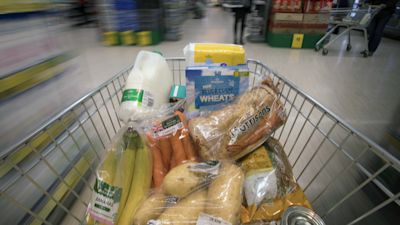Pasta and tea top list of soaring prices for everyday items - here's the full list

Some of the cheapest food in supermarkets has risen by nearly two-thirds in the last year, the Office for National Statistics (ONS) has said, heaping extra pressure on struggling households.
The statisticians said the cost of the lowest-priced vegetable oil had spiked 65% and the cheapest pasta was now 60% more expensive than a year ago.
The price of the cheapest tea had risen by 46%, chips were up 39%, bread rose by 38% and biscuits were up 34%.
Prices have risen across the board, but the ONS has collected 1.5 million prices over the last year to track changes to the cheapest available items on a supermarket’s website.
It gives a snapshot of the extra costs faced by households who are shopping on a budget.
The snapshot comes as the ONS released data on Tuesday showing that nearly half of UK adults are currently struggling to afford their bills, according to new figures.
Data released by the Office of National Statistics (ONS) has shown a rising percentage of the population is struggling to pay their energy bills, rent, or mortgage payments.
In September, figures showed that 45% of adults who paid energy bills were finding it very, or somewhat, difficult to pay for them. This is up from 40% back in June.
Some 30% of those paying rent or mortgages reported it was hard to afford - a figure that is up from 26% in June.
The figures were even more stark for those living with a disability, with figures suggesting that around 55% of disabled adults are struggling to pay their energy bills. Around a third of disabled adults are also finding it difficult to afford their rent or mortgage.
Price changes between September 2021 and September 2022
Vegetable oil: 65.2%
Pasta: 59.9%
Tea: 46%
Chips: 38.7%
Bread: 37.6%
Biscuits: 34.4%
Mixed frozen vegetables: 31.9%
Milk: 29.4%
Crisps: 23.7%
Tomatoes: 19.3%
Instant coffee: 18.8%
Sausages: 18.3%
Onions: 18%
Apples: 17.2%
Baked beans: 16.2%
Potatoes: 13.2%
Fish Fingers: 13.1%
Tomato ketchup: 12.1%
Breakfast cereal: 10.6%
Cheese: 10.4%
Chicken breast: 10.1%
Ham: 9.9%
Bananas: 7%
Fruit squash: 6.7%
Yoghurt: 6.6%
Pizza: 3.2%
Rice: -0.2%
Granulated sugar: -0.3%
Beef mince: -7.4%
Fruit juice orange: -8.9%
The analysis released by the ONS also shows that renters were struggling more than homeowners, with 39% of renters finding it difficult to afford their housing costs compared to 23% of homeowners struggling with their mortgage.
People who do not own their own homes are also finding it harder to pay for energy costs, with 60% struggling compared to 43% of homeowners.
Those bringing home less money also found themselves struggling to bear the cost of rising inflation and soaring costs.
Almost half of people with a personal income of less than £20,000 per year said they were finding it difficult to pay for their energy bills.
The proportion of people struggling to pay for energy bills dropped as personal income increased - with around 23% of people earning £50,000 reporting that they were also struggling.
In the period between September 29 and October 9, adults paying for their electricity or gas via prepayment (72%) more frequently reported they had trouble paying for energy than those who used a direct debit (42%).
Want a quick and expert briefing on the biggest news stories? Listen to our latest podcasts to find out What You Need To Know.